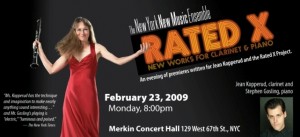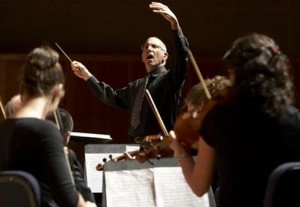It’s pretty easy to drive by Fredonia, NY without realizing you’ve done so…it’s one of the many small communities that dot the I-90 Interstate between Cleveland and Buffalo, practically on the shores of Lake Erie. The surrounding countryside is known for grapes and snow…Norman Rockwell would feel right at home in the town square, and it’s often found in the dictionary illustrating the definition of “quaint”.
Not exactly the place you’d expect to find a new music series, but that’s just the way we like it. Over 30 years ago the composition students at SUNY Fredonia began to fund their student concerts through the Student Association and since 2001 the Ethos New Music Society has fostered a major concert series in Western New York called the NewSound Festival. Within the past two years the festival has featured eighth blackbird, Ethel, Morton Subotnick, Missy Mazzoli and many others.
This year it was decided to focus on the piano as the thread tying the festival together, and as we’re now into our second week it seems to have been a very successful choice. Last week we kicked things off with the husband & wife team of pianist Kathleen Supové and composer Randall Woolf, who laid bare tales of their professional lives, discussed the essentials of living as a freelance composer and performer and gave a wonderful concert featuring two works by Randy as well as Jacob Tel Vendhuis, Anna Clyne and Neil Rolnick with video by Luke DuBois. I’d known both of them by reputation, recordings and Facebook, but it was a treat to finally get to meet them in person – and to find out that they had never been invited to speak anywhere together at the same time made it even more satisfying.

Kathy Supové performing Neil Rolnick’s “Digits” (Photo by Lori Deemer)
On Monday, it was time for some Cage, and Austin’s Michelle Schumann was kind enough to bring her prepared piano kit up to the Arctic Tundra that is Western NY and show the throngs of composers, pianists and percussionists how it’s done – first by giving an in-depth lecture on the history of the prepared piano and demonstration of how to prepare a piano without incurring the wrath of the piano techs (who had already fled the scene), and then by introducing over 200 of our student body to John Cage’s Sonatas & Interludes. When she was finished, those who weren’t thanking us for bringing her in were crowding around the piano to investigate the innocent carnage that was the bolts, erasers, screws and plastic strips that were expertly inserted between the strings.

Investigating the Prepared Piano post-concert (Photo by Lori Deemer)
Luckily we’re still not half-way through our NewSound Festival, in case you happen to be in the area – if you have any questions, contact me at deemer@fredonia.edu.
Here’s a breakdown of the rest of the festival:
Bowed Piano Ensemble with Stephen Scott, composer and Victoria Hansen, soprano
Rosch Recital Hall, SUNY Fredonia campus
Friday, Feb. 13: 4pm, Preparation Workshop & 8pm, Lecture/Demonstration
Saturday, Feb. 14: 8pm, Concert, $5 general public
Pianist Amy Briggs and Composer David Rakowski
Rosch Recital Hall, SUNY Fredonia campus
Thursday, Feb. 19: 8pm, Lecture/Demonstration
Friday, Feb. 20: 8pm, Concert, $5 general public
Pianist/Composer Amy Williams
Rosch Recital Hall, SUNY Fredonia campus
Tuesday, Feb. 24: 8pm, Concert, Free admission
Pianist Hilary Demske plays the music of Henry Martin
Rosch Recital Hall, SUNY Fredonia campus
Saturday, Feb. 28: 8pm, Concert, Free admission

 The
The  After a brief intermission, the
After a brief intermission, the 
 And our favorite crusty uncle, Seth Gordon, has word on a new-music Oscar tie-in that you may not be aware of: Yeah, yeah, we all know that the
And our favorite crusty uncle, Seth Gordon, has word on a new-music Oscar tie-in that you may not be aware of: Yeah, yeah, we all know that the  Just imagine the impression you will leave with your guests, as you drop sparkling bon mots on combinatoriality, pitch accumulators, harmelodics, and gradual phase shifting!… If they haven’t fled for the door yet…
Just imagine the impression you will leave with your guests, as you drop sparkling bon mots on combinatoriality, pitch accumulators, harmelodics, and gradual phase shifting!… If they haven’t fled for the door yet…
